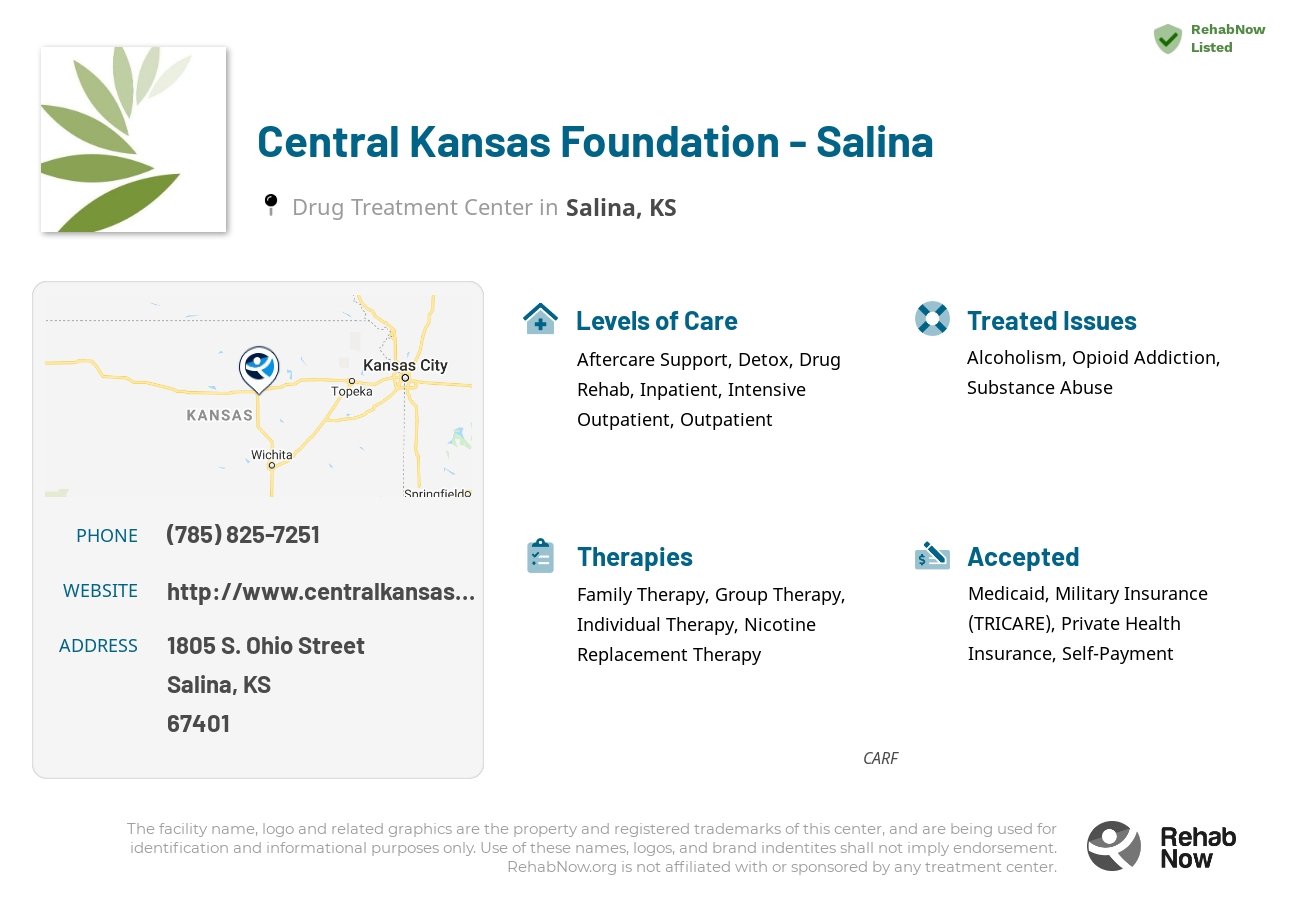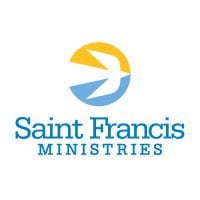Central Kansas Foundation - Salina
Drug Rehab Center in Salina, Kansas
Central Kansas Foundation - Salina is a CARF-accredited 20 bed facility providing evidence-based services and care for those trying to recover from alcohol, opioid, and other substance addictions and get back on the path of sobriety.
Multiple patients have reported Central Kansas Foundation - Salina as permanently closed.
Research other rehabs in Salina, Kansas, or get help finding an open facility.
About This Kansas Facility
Central Kansas Foundation - Salina, located in Salina, Kansas, is dedicated to helping individuals overcome addiction through a variety of treatment programs. This non-profit organization boasts 20 beds and is renowned for its trained professional staff and commitment to affordable, quality care. Unique in its approach, the facility prides itself on personalized and evidence-based treatment strategies.
Accredited by CARF, Central Kansas Foundation - Salina stands out for its high-quality and effective services. With recognition for their comprehensive care, the facility supports those struggling with alcoholism, opioid addiction, and other substance abuse disorders by providing a wide range of treatment options, all tailored to the needs of each individual.
- Accredited by CARF, ensuring adherence to internationally recognized standards of care and service.
- Offers a diverse array of treatment options, including detox, inpatient rehabilitation, and various outpatient programs.
- Provides aftercare support to promote long-term recovery, addressing the holistic needs of each individual for a healthier lifestyle.
Central Kansas Foundation - Salina specializes in treating a broad spectrum of addictions such as alcoholism, opioid addiction, and drug abuse. Their treatment methods are varied, including detoxification programs, inpatient rehabilitation, intensive outpatient, and standard outpatient services, all designed to support individuals towards achieving lasting sobriety.
Genders
Ages
Modality
Additional
Accreditations

CARF
The Commission on Accreditation of Rehabilitation Facilities (CARF) is a non-profit organization that specifically accredits rehab organizations. Founded in 1966, CARF's, mission is to help service providers like rehab facilities maintain high standards of care.
Conditions and Issues Treated
Substance Abuse Treatment is important when getting sober, as it helps addicts learn the skills they need to live a clean life. There are many different kinds of recovery treatment, including medication-assisted therapy, behavioral therapeutic approaches and self-help groups, as well as counseling.
Opioid abuse has become a national epidemic in the last decade. The US has one of the world’s highest rates of opioid use and abuse, as well as opioid-related deaths. Opioids are classified as Schedule II-IV controlled substances in the US due to their high potential for abuse.
Oxycodone, hydrocodone, methadone, and fentanyl are the most common Opioids and are commonly prescribed to treat pain. Tolerance to opioids develops over time, making life difficult, if not impossible, without them. Opioid users often obtain the drugs illegally. They can be drug dealers, friends, or family members who do not have valid prescriptions.
The desire for a more intense high than prescription opioids can quickly lead to heroin use. Heroin users are more prone to illness and death due to the high risk of overdose.
Many opioid addicts who seek treatment believe that the only way to overcome their addiction is through medical detox and long-term drug addiction rehab. To help patients wean off their addiction and reduce the risk of overdose, medication-assisted therapy (MAT) involves prescribing a replacement opioid. Doctors use MAT in conjunction with other anti-craving medications to help patients maintain recovery. Due to the high risk of relapse, MAT is often combined with individual and group counseling and social support programs.
Levels of Care Offered at Central Kansas Foundation - Salina
This center offers a variety of custom treatment tailored to individual recovery. Currently available are Aftercare Support, Detox, Drug Rehab, Inpatient, Intensive Outpatient, Outpatient, with additional therapies available as listed below.
The detoxification process typically includes some combination of the following: medical supervision, medication to help alleviate withdrawal symptoms, drug testing to monitor progress, and counseling.
Tackling the physical symptoms of withdrawal is essential to ensure that an individual can focus on the psychological aspects of the addiction without focusing on the physical pain that comes with withdrawal.
Withdrawal symptoms can be uncomfortable, even life-threatening, so carefully managing the detox process is extremely important. In many cases, more advanced pharmaceutical interventions are used to treat more severe withdrawal symptoms. Medication might help alleviate discomfort associated with detox, including nausea and headaches.
Inpatient treatment centers offer a safe, secure, and often medically supervised environment for drug or alcohol-addicted individuals. Many of these facilities are equipped to provide detoxification, treatment for co-occurring mental health disorders, and aftercare programs. The patient typically spends 28 to 30 days at the facility and will receive extensive drug counseling.
Intensive outpatient treatment is a form of addiction care that allows patients to continue living at home while undergoing treatment. This type of care is appropriate for patients who have been treated in residential treatment programs. Intensive outpatient programs include regular visits to the facility providing therapy, and patients gradually return to their routine life. IOP benefits most when patients have a supportive family member or friend to help them recover.
The first step to getting into an intensive outpatient program is to attend a detoxification facility. Detoxification facilities are designed to remove substances from the body safely. The patient will attend sessions designed to help them understand their addiction and its impact on their lives. While in an intensive outpatient program, therapy sessions are scheduled three to five times per week, with the patient attending no more than two sessions in one day.
An outpatient treatment program is set up to help with alcohol or drug addiction or a co-occurring disorder. The patient must attend the facility for their therapy and other programs but can return home each night.
The frequency of mandatory attendance decreases after much of Central Kansas Foundation - Salina‘s program is complete.
Outpatient treatment is a recovery approach that allows recovering addicts to live at home while getting rehab for addiction
An outpatient can include day treatments which include attending group sessions one hour per week. A person living in an outpatient environment may be allowed the opportunity to work full time if they choose to and continue studies without interruption from drugs/alcohol.
Outpatient treatment is an option for people who want to maintain their careers and families. Outpatients live at home but attend treatment such as individual counseling, group counseling, or twelve-step meetings during the day.
Aftercare support is vital to the success of someone in drug or alcohol treatment. It involves assisting with entering a sober living home, getting career counseling or educational assistance and even getting the individual lined up with programs like AA and NA. This support helps recovering addicts readjust to normal day-to-day activities and maintain sobriety.
When a person is in drug or alcohol treatment, they have to increase their focus on themselves. They need to learn how to recognize the triggers that cause them to relapse and learn the habits that would benefit them if they were to be sober. This is all part of the growth in recovery, and aftercare is essential to that process.
Therapies & Programs
At Central Kansas Foundation - Salina , to learn from past mistakes and improve one’s situation, the recovering person meets individually with a therapist. The counselor or therapist will address addiction causes, triggers, mental issues, dual diagnosis, and aftercare plans during this time. This is a very intense and challenging process. Some clients find it easier to open up to someone other than family or friends who understand their struggles with addiction.
Family therapy is a crucial part of drug treatment and getting sober. It is one of the most effective ways to help addicts stay on the path to long-term sobriety. An addict’s family can play a vital part in helping them to avoid relapse. They can spot the warning signs and help them get back on track.
In group therapy, recovering addicts meet with a therapist and other people in recovery. Some groups are closed, meaning only people who share the same addiction or problem can attend. Others are open to anyone who wants to stop using drugs or drinking alcohol. Group therapy sessions typically focus on one topic each week or month so that recovering addicts can discuss issues they face daily.
Cognitive Behavioral Therapy (CBT) is based on the idea that how we feel, think and act all interact together. It helps people explore their thoughts for problems (or false beliefs) that influence their mood and actions. CBT is very goal-oriented, which means that the therapist and patient work together on a specific problem. In addition to helping a client focus on thoughts that can be changed, CBT also allows them to take an active role in their treatment. Our thoughts determine our feelings and behaviors; our feelings affect our thoughts, and our behaviors change our thoughts and feelings.
Payment Options Accepted
For specific insurance or payment methods please contact us.
Is your insurance accepted?
Ask an expert, call (888) 674-0062
Central Kansas Foundation Associated Centers
Discover treatment facilities under the same provider.
- Central Kansas Foundation - McPherson in McPherson, KS
- Central Kansas Foundation - Abilene in Abilene, KS
- Central Kansas Foundation - Mcpherson in Mcpherson, KS
- Central Kansas Foundation - Abilene in Abilene, KS
- Central Kansas Foundation - Pathfinder Recovery Center in Salina, KS
Learn More About Central Kansas Foundation Centers
Additional Details
Specifics, location, and helpful extra information.
Salina, Kansas 67401 Phone Number(785) 825-7251 Meta DetailsUpdated April 15, 2024
Staff Verified
Patient Reviews
There are no reviews yet. Be the first one to write one.
Salina, Kansas Addiction Information
About 42% of adults in Kansas have tried an illicit drug at some point in their lives. 12.4% of the state population uses illegal drugs and 4.5% abuse alcohol in a given year. 15.16% of all deaths in Kansas between 2008 and 2017 were caused by either drugs or alcohol.
8% of people in Salina, KS are addicted to drugs or alcohol. Drug overdose deaths due to heroin have quadrupled in the last 5 years. 13% of all overdoses were from opioids, including prescription painkillers and heroin. Women accounted for 70% of fatalities due to opioid overdoses. The most common types of treatment include inpatient rehab and outpatient rehab. 12-step programs are based on the principles of Alcoholics Anonymous.
Treatment in Nearby Cities
- Girard, KS (174.8 mi.)
- Halstead, KS (56.3 mi.)
- Mission, KS (158.8 mi.)
- Larned, KS (92.4 mi.)
- Osawatomie, KS (144.4 mi.)
Centers near Central Kansas Foundation - Salina
The facility name, logo and brand are the property and registered trademarks of Central Kansas Foundation - Salina, and are being used for identification and informational purposes only. Use of these names, logos and brands shall not imply endorsement. RehabNow.org is not affiliated with or sponsored by Central Kansas Foundation - Salina.





